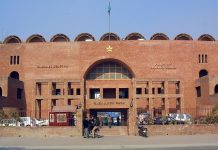Sports Desk
TOKYO: Tokyo Olympic organisers seem to be leaning away from starting the rescheduled games in the spring of 2021. More and more the signs point toward the summer of 2021.
Japanese media reported on Sunday that the International Olympic Committee (IOC) and Japanese organisers are in final stages of talks to set the opening date for the Tokyo Games in July next year following the historic decision to delay the event.
The Tokyo event, postponed last week due to the coronavirus pandemic, will most likely have its opening ceremony in 2021 on July 23 and closing ceremony on August 8, each a day earlier on the calendar than the original 2020 plan, said public broadcaster NHK on Sunday, citing unnamed sources within the organising panel.
It came after Tokyo Governor Yuriko Koike raised the idea on Friday of moving the event to a less hot and humid time of year.
She argued that this would make marathons and other races easier to endure, meaning they could be held in the capital instead of in northern Sapporo city, where the IOC had decided to move them.
The Tokyo 2020 team led by Yoshiro Mori is currently discussing possible dates with the IOC, according to the Asahi Shimbun newspaper.
On Saturday, Mori told a Japanese TV station that “some kind of conclusion” would be reached within a week when the organising committee’s executive board meets.
Mori suggested there would be no major change from 2020.
“The games are meant to be in summer, so we should be thinking of a time between June and September,” Japanese news agency Kyodo reported Mori saying.
IOC president Thomas Bach, after the postponement was announced in Switzerland on Tuesday, left open the possibility of spring dates.
The postponed games were to have opened on July 24 and closed on August 9.
Any final decision will be made between local organisers and the IOC, and hundreds of sponsors, sports federations and broadcasters.
Athletes have been left in limbo by the postponement. Many have been forced to stop training because of the spreading coronavirus. Even those who can train have no idea about how to schedule training to reach peak fitness at the right time.
Mori and organising committee CEO Toshiro Muto have both said the added cost of rescheduling will be enormous. Early estimates put those costs at between $2-3 billion with the several levels of Japanese governments likely to foot most of the bills.
Tokyo organisers say they are spending $12.6 billion to stage the games. However, a government audit report said it will cost at least twice that much. All but $5.6 billion is public money.
The Switzerland-based IOC has contributed $1.3 billion to organise the Tokyo Olympics, according local organising committee documents. It has a reserve fund of about $2 billion for such emergencies and also has insurance coverage.
Economy Minister Yasutoshi Nishimura said on Sunday the government, now compiling economic-stimulus measures that Prime Minister Shinzo Abe said will be the biggest ever, will take into account that the Olympic delay will push back several trillions of yen (tens of billions of dollars) of demand to next year.
“If demand is being pushed back until next year, that means the same amount of demand will evaporate this year. We’ll take this into account” in compiling the stimulus package, Nishimura told a television programme.
Meanwhile, NHK said the Olympic flame would be displayed for a month at the J-Village sports complex in Fukushima, which was used as a base camp for thousands of relief workers in radiation protection suits during the 2011 nuclear disaster.





